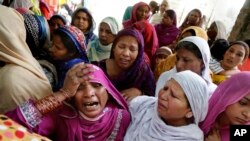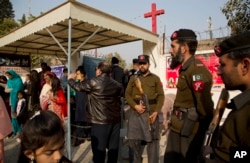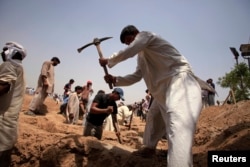In late March, Syed Anees Shah, a Pakistani prosecutor, gathered a number of Christian suspects outside his court and offered them acquittal in exchange for their conversion to Islam.
Shah was prosecuting more than 40 Christians on charges of involvement in a brutal lynching in which two Muslim men were beaten to death in the aftermath of deadly suicide blasts at two churches in Lahore two years ago. The attacks killed 15 worshippers during Sunday services.
After the blasts, angry protesters gathered at the scene and attacked two unknown Muslims whom they suspected of having ties to militants and set their bodies ablaze.
Police used cellphone videos and pictures taken by bystanders to identify those involved in the lynching. The evidence led to the arrest of more than 40 Christians from Youhanabad, a densely populated Christian neighborhood in Lahore.
The suspects were being tried in an anti-terrorism court in Lahore when prosecutor Shah offered them the deal.
Joseph Francis, a defense attorney for the accused Christians, told reporters about Shah's offer to the defendants. "He tells them that if they embrace Islam, he can guarantee them their acquittal in the case," Francis said.
The story was initially reported by Pakistan's Tribune newspaper.
Fled the country
Francis has reportedly left the country for fear of retribution after revealing the case to reporters.
"Joseph Francis, the rights activist providing legal assistance to the accused in a Lahore lynching case, left the country right after he reported the incident to the media. He has still not returned to Pakistan," Naeem Qaiser, a senior political reporter for TV news channel 92 in Lahore, told VOA.
Human rights activists were outraged by the prosecutor's offer, calling it a criminal offense.
"This is blackmailing," Mehdi Hasan, former chairperson of the Human Rights Commission of Pakistan, told VOA. "According to the law and the constitution of Pakistan, no one can force anybody to change his or her religion."
Some lawyers contend that many of those in custody on charges related to the lynching were in fact innocent bystanders.
"Most of the men were innocent. They were just standing there and had nothing to do with the lynching, but they're in jail now," Adnan Shamim Bhatti, a lawyer from Youhanabad, told VOA.
Government's response
As the story was picked by the media, the provincial government intervened and launched an investigation against Shah, who initially denied the charges against him but later admitted to offering the deal after evidence emerged that seemed to confirm the defendants' claim.
Shah was reportedly videotaped while offering the deal outside the court in Lahore.
"The government is aware of the incident and an initial committee has been established to further look into this matter," Malik Ahmed Khan, a spokesperson for the Punjab provincial government, told VOA.
"Mr. Shah has been relieved of all his responsibilities as a prosecutor," Khan added.
Pakistan's government stresses a strict policy of zero tolerance for forced conversions.
"We've suffered a lot in the last so many decades due to religious intolerance. This particular case will speak for itself and will set an example," spokesperson Khan said.
Minorities discriminated against
"The prompt response from the government is commendable," said Romana Bashir, a Christian who is the executive director for the Peace and Development Foundation. "For me and my community, this is a positive response,"
But for many, this was more than an isolated case.
"Our society is very emotional when it comes to religion," Bashir told VOA. "It's not a matter of one case. I hope the government will keep addressing the issues related to minorities and this will give us [Christians] a sense of belonging to this country as well."
Christians are one of the largest non-Muslim minorities, representing about 1.6 percent of the Pakistani population. Christians frequently complain of being harassed by radicals and at times forced to convert to Islam. They are also often accused of violating the country's controversial anti-blasphemy law.
In some cases, just being accused of violating the anti-blasphemy law will draw the attention of those who believe in its strict implementation — and that means a serious threat to the accused person's life.
In 2014, an angry mob in Kot Radha Kishan city in Punjab province beat a Christian couple to death after they were accused of desecrating the Quran.
Christians are not the only minority group being persecuted in Pakistan. The Ahmadi community, a religious sect, recently released its annual report, which noted an increase in violence against Ahmadis and their mosques across Pakistan in 2016.
Days after the report was released, a prominent Ahmadi community leader and a lawyer, Malik Saleem Latif, was killed by unknown gunmen in Punjab's Nankana Sahib district.
Sympathy with extremists
In Pakistan, dealing with extremism and religious hatred is complicated by the fact that some political leaders openly sympathize with banned militant organizations that promote religious intolerance.
Human rights groups and activists have accused the government of not taking strong measures to keep in check those who spread hatred against religious minorities.
"Those who play politics in the name of religion in Pakistan have strong roots and the government's behavior is apologetic," rights activist Hasan told VOA. "It clearly shows the government is not able to take a firm stand against religious intolerance."







